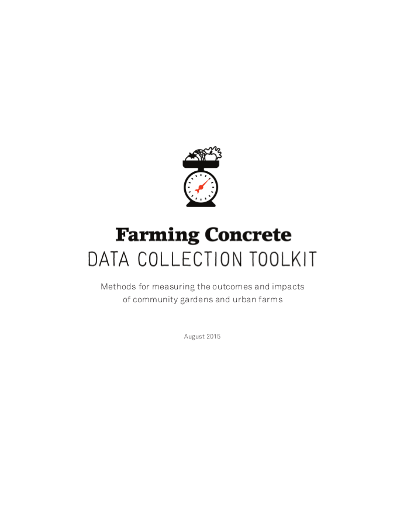As part of the Five Borough Farm project, the Design Trust for Public Space co-developed this data collection toolkit with farmers, gardeners, and Farming Concrete to fill the need for urban agriculture data nationwide. The project team recruited over 30 participants for a day-long workshop called Making the Measure to identify topics they would like to measure and track at their farms or gardens. The farmers and gardeners brainstormed new ways of generating and collecting data about the things that mattered most at each garden to refine strategies for measurement that were simple, realistic, and achievable. Following the workshop, the project team refined the draft methods into a data collection toolkit that farmers and gardeners field-tested throughout the growing season. At the close of the harvest season, the Design Trust convened the participants who field-tested the toolkit to report on their efforts and discuss what worked and what did not work. Farmers and gardeners provided insights for revising and expanding the set of methods and tools. Since then, we expanded the Toolkit to include a total of twenty methods organized into five categories: Food Production Data, Environmental Data, Social Data, Health Data, and Economic Data.
The Design Trust established a collaboration with Farming Concrete to develop its online data platform to track the other meaningful contributions farms and gardens make to residents, communities, and the city at large. You can now enter in all the data you collect using this Toolkit right here on Farming Concrete- this database mirrors the hard copy of the Toolkit by providing online forms for each of the twenty methods.
Downloads
You can download the Toolkit [PDF, 9.4MB] to start collecting data on the good things happening in your garden or farm. To save paper (and be mindful of your wallet), we encourage you to only print the methods that will be useful for you! There is a lower resolution version [PDF, 4.9MB] that you can download, too.
Instructional Videos
0.0 Food Production
1.0 Environmental Data
2.0 Social Data
3.0 Health Data
4.0 Economic Data


